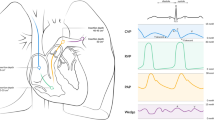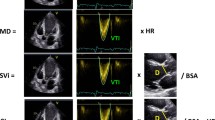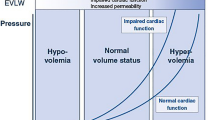Abstract
Supplementary oxygen is commonly administered in current medical practice. Recently it has been suggested that hyperoxia causes acute oxidative stress and produces prompt and substantial changes in coronary resistance in patients with ischemic heart disease. In this report, we examined whether the effects of hyperoxia on coronary blood velocity (CBV) would be associated with a reduction in myocardial function. We were also interested in determining if the postulated changes in left ventricular (LV) function seen with tissue Doppler imaging (TDI) could be reversed with intravenous vitamin C, a potent, acute anti-oxidant. LV function was determined in eight healthy subjects with transthoracic echocardiography and TDI before and after hyperoxia and with and without infusing vitamin C. Hyperoxia compared with room air promptly reduced CBV by 28 ± 3% (from 23.50 ± 2.31 cm/s down to 17.00 ± 1.79 cm/s) and increased relative coronary resistance by 34 ± 5% (from 5.63 ± 0.88 up to 7.32 ± 0.94). Meanwhile, LV myocardial systolic velocity decreased by 11 ± 6% (TDI). These effects on flow and function were eliminated by the infusion of vitamin C, suggesting that these changes are mediated by vitamin C-quenchable substances acting on the coronary microcirculation.




Similar content being viewed by others
References
Abali G, Tokgozoglu L, Ozcebe OI, Aytemir K, Nazli N (2005) Which Doppler parameters are load independent? A study in normal volunteers after blood donation. J Am Soc Echocardiogr 18:1260–1265
Alam M, Wardell J, Andersson E, Samad BA, Nordlander R (2000) Effects of first myocardial infarction on left ventricular systolic and diastolic function with the use of mitral annular velocity determined by pulsed wave Doppler tissue imaging. J Am Soc Echocardiogr 13:343–352
Antman EM, Anbe DT, Armstrong PW, Bates ER, Green LA, Hand M, Hochman JS, Krumholz HM, Kushner FG, Lamas GA, Mullany CJ, Ornato JP, Pearle DL, Sloan MA, Smith SC Jr (2004) ACC/AHA guidelines for the management of patients with ST-elevation myocardial infarction—executive summary. A report of the American College of Cardiology/American Heart Association Task Force on Practice Guidelines (Writing Committee to revise the 1999 guidelines for the management of patients with acute myocardial infarction). J Am Coll Cardiol 44:671–719
Bailey DM, Young IS, McEneny J, Lawrenson L, Kim J, Barden J, Richardson RS (2004) Regulation of free radical outflow from an isolated muscle bed in exercising humans. Am J Physiol Heart Circ Physiol 287:H1689–H1699
Baron JF, Vicaut E, Hou X, Duvelleroy M (1990) Independent role of arterial O2 tension in local control of coronary blood flow. Am J Physiol Heart Circ Physiol 258:H1388–H1394
Cai H, Harrison DG (2000) Endothelial dysfunction in cardiovascular diseases: the role of oxidant stress. Circ Res 87:840–844
Dallinger S, Dorner GT, Wenzel R, Graselli U, Findl O, Eichler HG, Wolzt M, Schmetterer L (2000) Endothelin-1 contributes to hyperoxia-induced vasoconstriction in the human retina. Invest Ophthalmol Vis Sci 41:864–869
Daniell HB, Bagwell EE (1968) Effects of high oxygen on coronary flow and heart force. Am J Physiol 214:1454–1459
Derumeaux G, Ovize M, Loufoua J, Andre-Fouet X, Minaire Y, Cribier A, Letac B (1998) Doppler tissue imaging quantitates regional wall motion during myocardial ischemia and reperfusion. Circulation 97:1970–1977
Feigl EO (1983) Coronary physiology. Physiol Rev 63:1–205
Feigl EO (1987) The paradox of adrenergic coronary vasoconstriction. Circulation 76:737–745
Gao Z, Momen A, Novick M, Williams R, Cyran S, Blaha C, Mast J, Spilk S, Leuenberger U, Sinoway L (2009) Weight loss attenuates oxidative stress related-coronary vasoconstriction in obese adolescents. FASEB J 23:1032.1033 (abstract)
Giakoumis A, Berdoukas V, Gotsis E, Aessopos A (2007) Comparison of echocardiographic (US) volumetry with cardiac magnetic resonance (CMR) imaging in transfusion dependent thalassemia major (TM). Cardiovasc Ultrasound 5:24
Haque WA, Boehmer J, Clemson BS, Leuenberger UA, Silber DH, Sinoway LI (1996) Hemodynamic effects of supplemental oxygen administration in congestive heart failure. J Am Coll Cardiol 27:353–357
Henein MY, Gibson DG (1999) Long axis function in disease. Heart 81:229–231
Hozumi T, Yoshida K, Akasaka T, Asami Y, Ogata Y, Takagi T, Kaji S, Kawamoto T, Ueda Y, Morioka S (1998) Noninvasive assessment of coronary flow velocity and coronary flow velocity reserve in the left anterior descending coronary artery by Doppler echocardiography: comparison with invasive technique. J Am Coll Cardiol 32:1251–1259
Huang AH, Feigl EO (1988) Adrenergic coronary vasoconstriction helps maintain uniform transmural blood flow distribution during exercise. Circ Res 62:286–298
Jamieson D, Chance B, Cadenas E, Boveris A (1986) The relation of free radical production to hyperoxia. Annu Rev Physiol 48:703–719
Jia L, Bonaventura C, Bonaventura J, Stamler JS (1996) S-nitrosohaemoglobin: a dynamic activity of blood involved in vascular control. Nature 380:221–226
Kaufmann PA, Gnecchi-Ruscone T, di Terlizzi M, Schafers KP, Luscher TF, Camici PG (2000) Coronary heart disease in smokers: vitamin C restores coronary microcirculatory function. Circulation 102:1233–1238
Lammerant J, Schryver CD, Becsei I, Camphyn M, Mertens-Strijthagen J (1969) Coronary circulation response to hyperoxia after vagotomy and combined alpha and beta adrenergic receptors blockade in the anesthetized intact dog. Pflügers Arch 308:185–196
Landmesser U, Harrison D, Drexler H (2006) Oxidant stress—a major cause of reduced endothelial nitric oxide availability in cardiovascular disease. Eur J Clin Pharmacol 62:13–19
Lang RM, Bierig M, Devereux RB, Flachskampf FA, Foster E, Pellikka PA, Picard MH, Roman MJ, Seward J, Shanewise JS, Solomon SD, Spencer KT, Sutton MS, Stewart WJ (2005) Recommendations for chamber quantification: a report from the American Society of Echocardiography’s Guidelines and Standards Committee and the Chamber Quantification Writing Group, developed in conjunction with the European Association of Echocardiography, a branch of the European Society of Cardiology. J Am Soc Echocardiogr 18:1440–1463
Lavi S, Yang EH, Prasad A, Mathew V, Barsness GW, Rihal CS, Lerman LO, Lerman A (2008) The interaction between coronary endothelial dysfunction, local oxidative stress, and endogenous nitric oxide in humans. Hypertension 51:127–133
Lee PJ, Choi AM (2003) Pathways of cell signaling in hyperoxia. Free Radic Biol Med 35:341–350
Levine GN, Frei B, Koulouris SN, Gerhard MD, Keaney JF Jr, Vita JA (1996) Ascorbic acid reverses endothelial vasomotor dysfunction in patients with coronary artery disease. Circulation 93:1107–1113
Luecke T, Roth H, Herrmann P, Joachim A, Weisser G, Pelosi P, Quintel M (2004) Assessment of cardiac preload and left ventricular function under increasing levels of positive end-expiratory pressure. Intensive Care Med 30:119–126
Mak S, Azevedo ER, Liu PP, Newton GE (2001) Effect of hyperoxia on left ventricular function and filling pressures in patients with and without congestive heart failure. Chest 120:467–473
Mak S, Egri Z, Tanna G, Colman R, Newton GE (2002) Vitamin C prevents hyperoxia-mediated vasoconstriction and impairment of endothelium-dependent vasodilation. Am J Physiol Heart Circ Physiol 282:H2414–H2421
Marcus M, Wright C, Doty D, Eastham C, Laughlin D, Krumm P, Fastenow C, Brody M (1981) Measurements of coronary velocity and reactive hyperemia in the coronary circulation of humans. Circ Res 49:877–891
Mayer B, Andrew P (1998) Nitric oxide synthases: catalytic function and progress towards selective inhibition. Naunyn Schmiedebergs Arch Pharmacol 358:127–133
McNulty PH, King N, Scott S, Hartman G, McCann J, Kozak M, Chambers CE, Demers LM, Sinoway LI (2005) Effects of supplemental oxygen administration on coronary blood flow in patients undergoing cardiac catheterization. Am J Physiol Heart Circ Physiol 288:H1057–H1062
McNulty PH, Robertson BJ, Tulli MA, Hess J, Harach LA, Scott S, Sinoway LI (2007) Effect of hyperoxia and vitamin C on coronary blood flow in patients with ischemic heart disease. J Appl Physiol 102:2040–2045
Messina EJ, Sun D, Koller A, Wolin MS, Kaley G (1994) Increases in oxygen tension evoke arteriolar constriction by inhibiting endothelial prostaglandin synthesis. Microvasc Res 48:151–160
Momen A, Gahremanpour A, Mansoor A, Kunselman A, Blaha C, Pae W, Leuenberger UA, Sinoway LI (2007) Vasoconstriction seen in coronary bypass grafts during handgrip in humans. J Appl Physiol 102:735–739
Momen A, Mascarenhas V, Gahremanpour A, Gao Z, Moradkhan R, Kunselman A, Boehmer J, Sinoway LI, Leuenberger UA (2009) Coronary blood flow responses to physiological stress in humans. Am J Physiol Heart Circ Physiol 296:H854–H861
Moradkhan R, Sinoway LI (2010) Revisiting the role of oxygen therapy in cardiac patients. J Am Coll Cardiol 56:1013–1016
Mouren S, Souktani R, Beaussier M, Abdenour L, Arthaud M, Duvelleroy M, Vicaut E (1997) Mechanisms of coronary vasoconstriction induced by high arterial oxygen tension. Am J Physiol Heart Circ Physiol 272:H67–H75
Nikitin NP, Witte KK (2004) Application of tissue Doppler imaging in cardiology. Cardiology 101:170–184
Ommen SR, Nishimura RA, Appleton CP, Miller FA, Oh JK, Redfield MM, Tajik AJ (2000) Clinical utility of Doppler echocardiography and tissue Doppler imaging in the estimation of left ventricular filling pressures: a comparative simultaneous Doppler-catheterization study. Circulation 102:1788–1794
Pasgaard T, Stankevicius E, Jorgensen MM, Ostergaard L, Simonsen U, Frobert O (2007) Hyperoxia reduces basal release of nitric oxide and contracts porcine coronary arteries. Acta Physiol (Oxf) 191:285–296
Rawles JM, Kenmure AC (1976) Controlled trial of oxygen in uncomplicated myocardial infarction. Br Med J 1:1121–1123
Rivas F, Rembert JC, Bache RJ, Cobb FR, Greenfield JC Jr (1980) Effect of hyperoxia on regional blood flow after coronary occlusion in awake dogs. Am J Physiol Heart Circ Physiol 238:H244–H248
Rousseau A, Bak Z, Janerot-Sjoberg B, Sjoberg F (2005) Acute hyperoxaemia-induced effects on regional blood flow, oxygen consumption and central circulation in man. Acta Physiol Scand 183:231–240
Rubanyi GM, Vanhoutte PM (1986) Superoxide anions and hyperoxia inactivate endothelium-derived relaxing factor. Am J Physiol Heart Circ Physiol 250:H822–H827
Rush JW, MacLean DA, Hultman E, Graham TE (1995) Exercise causes branched-chain oxoacid dehydrogenase dephosphorylation but not AMP deaminase binding. J Appl Physiol 78:2193–2200
Sahn DJ, DeMaria A, Kisslo J, Weyman A (1978) Recommendations regarding quantitation in M-mode echocardiography: results of a survey of echocardiographic measurements. Circulation 58:1072–1083
Sauls BA, Boegehold MA (2000) Arteriolar wall PO(2) and nitric oxide release during sympathetic vasoconstriction in the rat intestine. Am J Physiol Heart Circ Physiol 279:H484–H491
Seals DR, Johnson DG, Fregosi RF (1991) Hyperoxia lowers sympathetic activity at rest but not during exercise in humans. Am J Physiol Regul Integr Comp Physiol 260:R873–R878
Shan K, Bick RJ, Poindexter BJ, Shimoni S, Letsou GV, Reardon MJ, Howell JF, Zoghbi WA, Nagueh SF (2000) Relation of tissue Doppler derived myocardial velocities to myocardial structure and beta-adrenergic receptor density in humans. J Am Coll Cardiol 36:891–896
Taddei S, Virdis A, Ghiadoni L, Magagna A, Salvetti A (1998) Vitamin C improves endothelium-dependent vasodilation by restoring nitric oxide activity in essential hypertension. Circulation 97:2222–2229
Teramoto K, Daimon M, Hasegawa R, Toyoda T, Sekine T, Kawata T, Yoshida K, Komuro I (2004) Acute effect of oral vitamin C on coronary circulation in young healthy smokers. Am Heart J 148:300–305
Van de Werf F, Ardissino D, Betriu A, Cokkinos DV, Falk E, Fox KA, Julian D, Lengyel M, Neumann FJ, Ruzyllo W, Thygesen C, Underwood SR, Vahanian A, Verheugt FW, Wijns W (2003) Management of acute myocardial infarction in patients presenting with ST-segment elevation. The Task Force on the Management of Acute Myocardial Infarction of the European Society of Cardiology. Eur Heart J 24:28–66
Wilson RF, Laughlin DE, Ackell PH, Chilian WM, Holida MD, Hartley CJ, Armstrong ML, Marcus ML, White CW (1985) Transluminal, subselective measurement of coronary artery blood flow velocity and vasodilator reserve in man. Circulation 72:82–92
Yu CM, Sanderson JE, Marwick TH, Oh JK (2007) Tissue Doppler imaging a new prognosticator for cardiovascular diseases. J Am Coll Cardiol 49:1903–1914
Acknowledgments
We are thankful to Cheryl Blaha and Jessica Mast for their expert study coordination and invaluable technical assistance during the studies. The authors also express gratitude to Jennifer Stoner for her outstanding secretarial skills. Grant R01 HL070222 from the National Institutes of Health (LS) and this project is funded, in part, under a grant with the Pennsylvania Department of Health using Tobacco Settlement Funds. The Department specifically disclaims responsibility for any analyses, interpretations or conclusions (LS).
Conflict of interest
None.
Author information
Authors and Affiliations
Corresponding author
Additional information
Communicated by Keith Phillip George.
Rights and permissions
About this article
Cite this article
Gao, Z., Spilk, S., Momen, A. et al. Vitamin C prevents hyperoxia-mediated coronary vasoconstriction and impairment of myocardial function in healthy subjects. Eur J Appl Physiol 112, 483–492 (2012). https://doi.org/10.1007/s00421-011-1997-x
Received:
Accepted:
Published:
Issue Date:
DOI: https://doi.org/10.1007/s00421-011-1997-x




